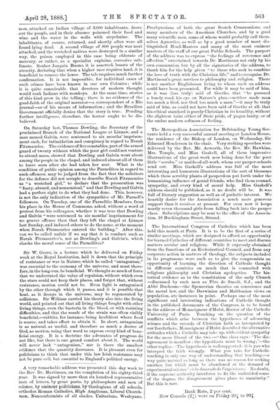The International Congress of Catholics which has been held this
month at Paris. It is to be the first of a series of similar meetings, which are designed to afford an opportunity for learned Catholics of different countries to meet and discuss matters secular and religious. While it expressly abstained from the functions of an Ecclesiastical Council, and from any corporate action in matters of theology, the subjects included in its programme were such as to give the congressista an opportunity of learning the direction of Catholic thought in different countries on much that is connected with religious philosophy and Christian apologetics. The his- torical evidence as to the constitution of the early Church —discussed by such men as Pere de Smedt, S.J., and the Abbe Duchesne—the Spencerian theories on conscience and the moral law, and the Darwinian and Malthusian views on population, are instances in point. Perhaps one of the most significant and interesting indications of Catholic thought in the published documents of the Congress, is to be found in the address of Monseigneur d'Hulst, Rector of the Catholic University of Paris. Touching on the question of the conflicts which arise between the hypotheses of advancing science and the records of Christian faith as interpreted by our forefathers, Monseigneur d'Hulst described the alternative attitudes which a Catholic may take up, with evident sympathy for the more liberal of the two :—" One class says : 'The dis- agreement is manifest : the hypothesis must be wrong; '—the other replies : The hypothesis is well supported : it is you who interpret the faith wrongly. What you take for Catholic teaching is only one way of understanding that teaching,—a way quite natural as long as there was no reason for seeking another, but which must be abandoned at the demand of experimental science' (a la denuinde de l'exp(rience). No doubt, if the supreme authority interferes to fix the undecided sense of the dogma, the disagreement gives place to unanimity." But this is rare.


































 Previous page
Previous page